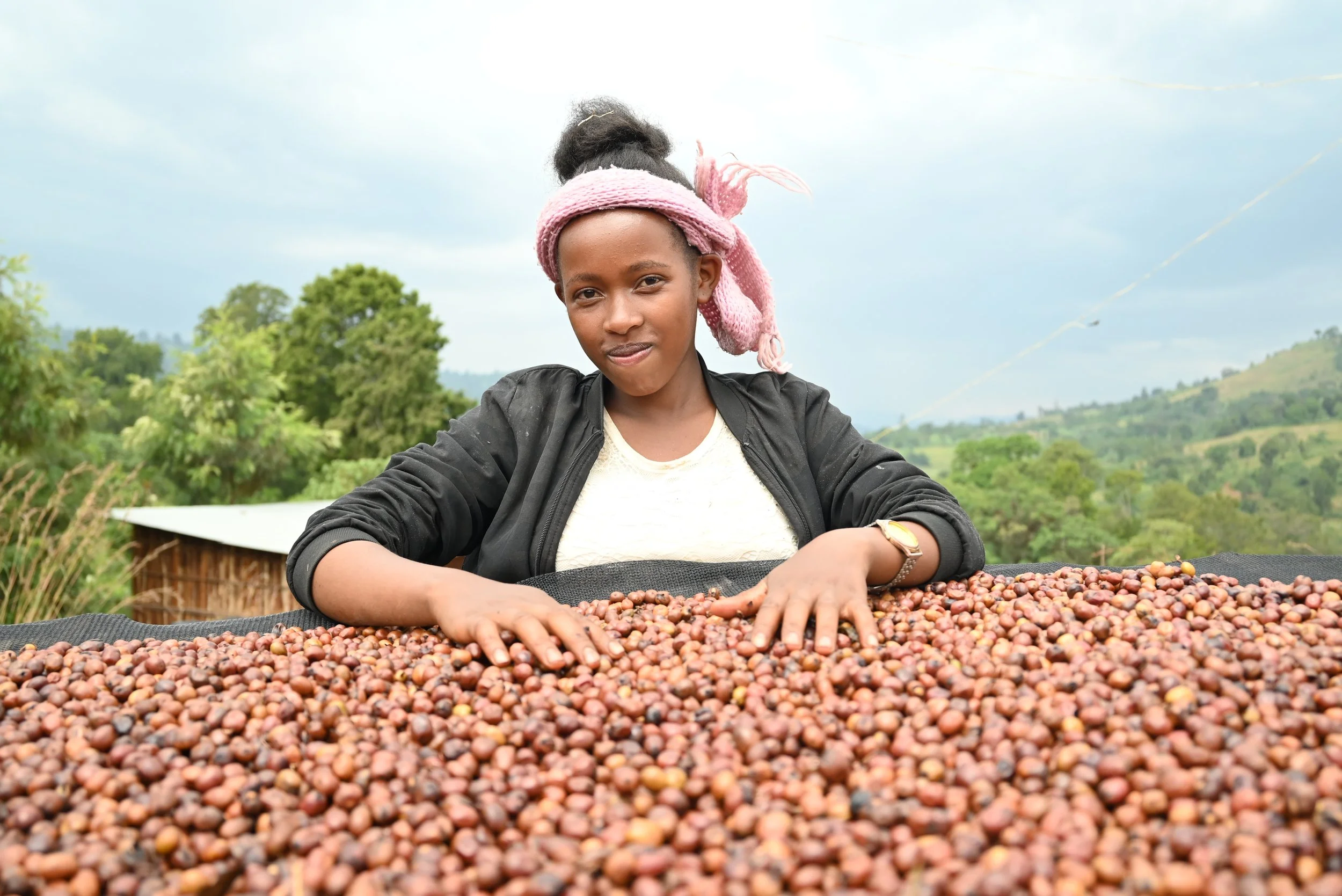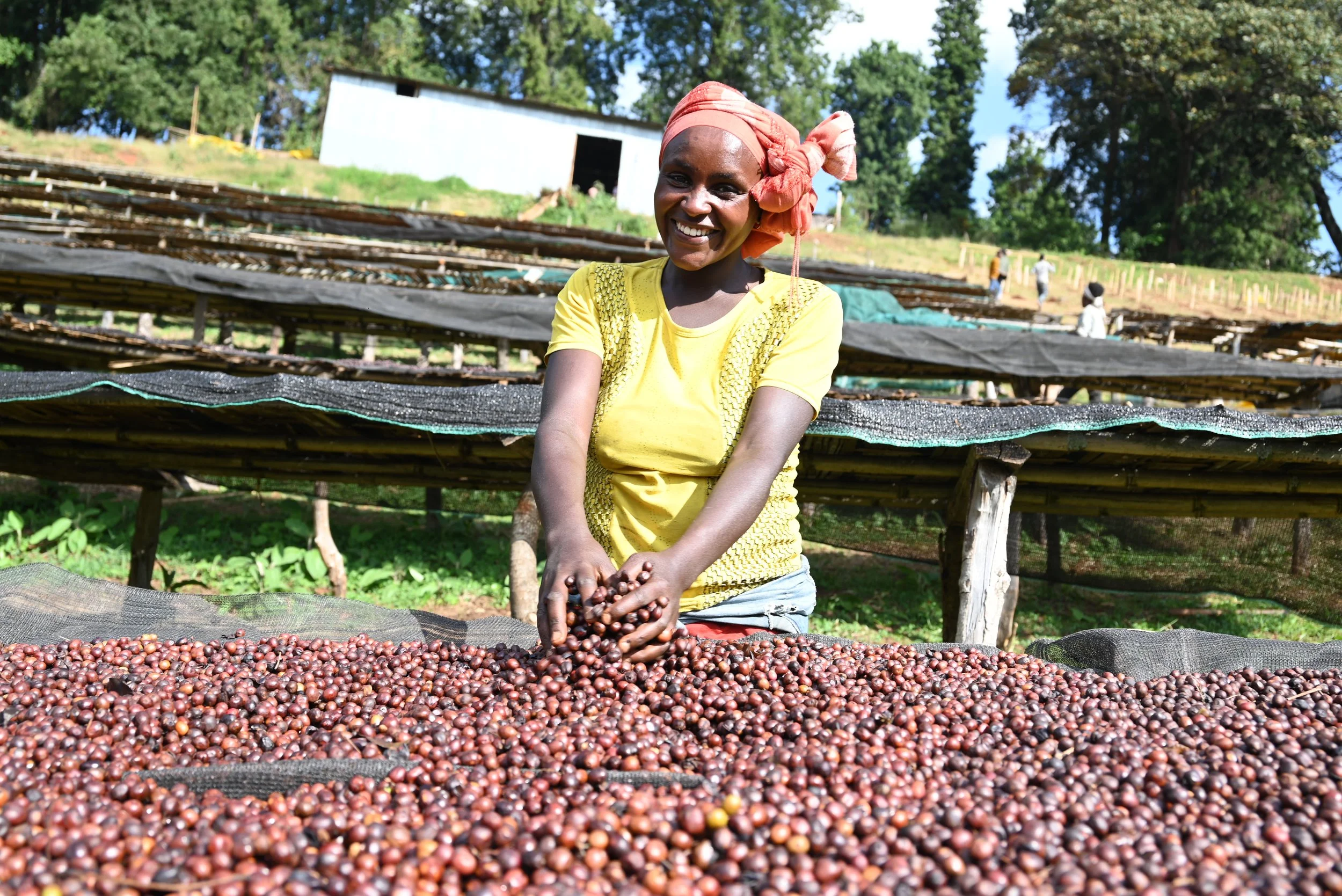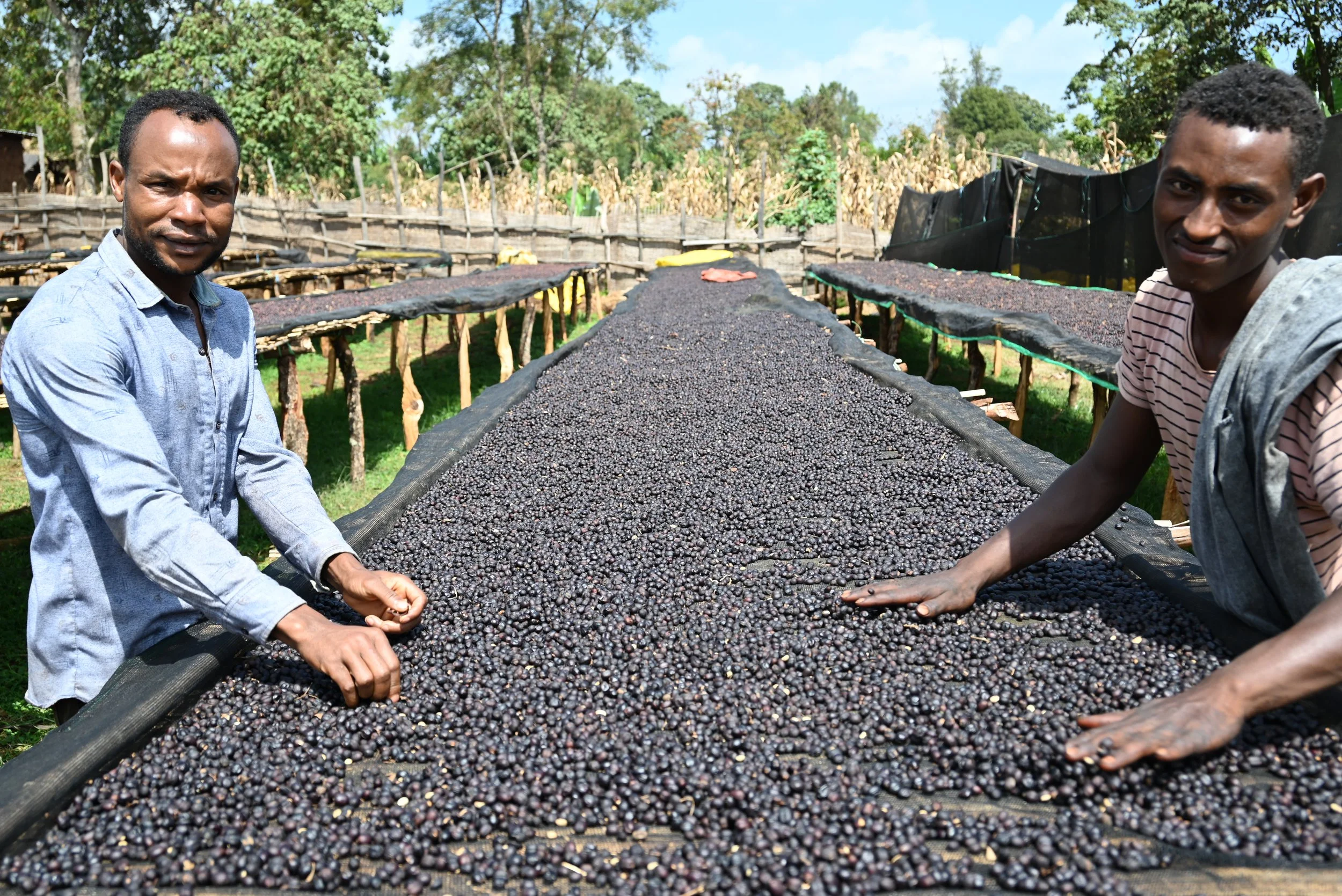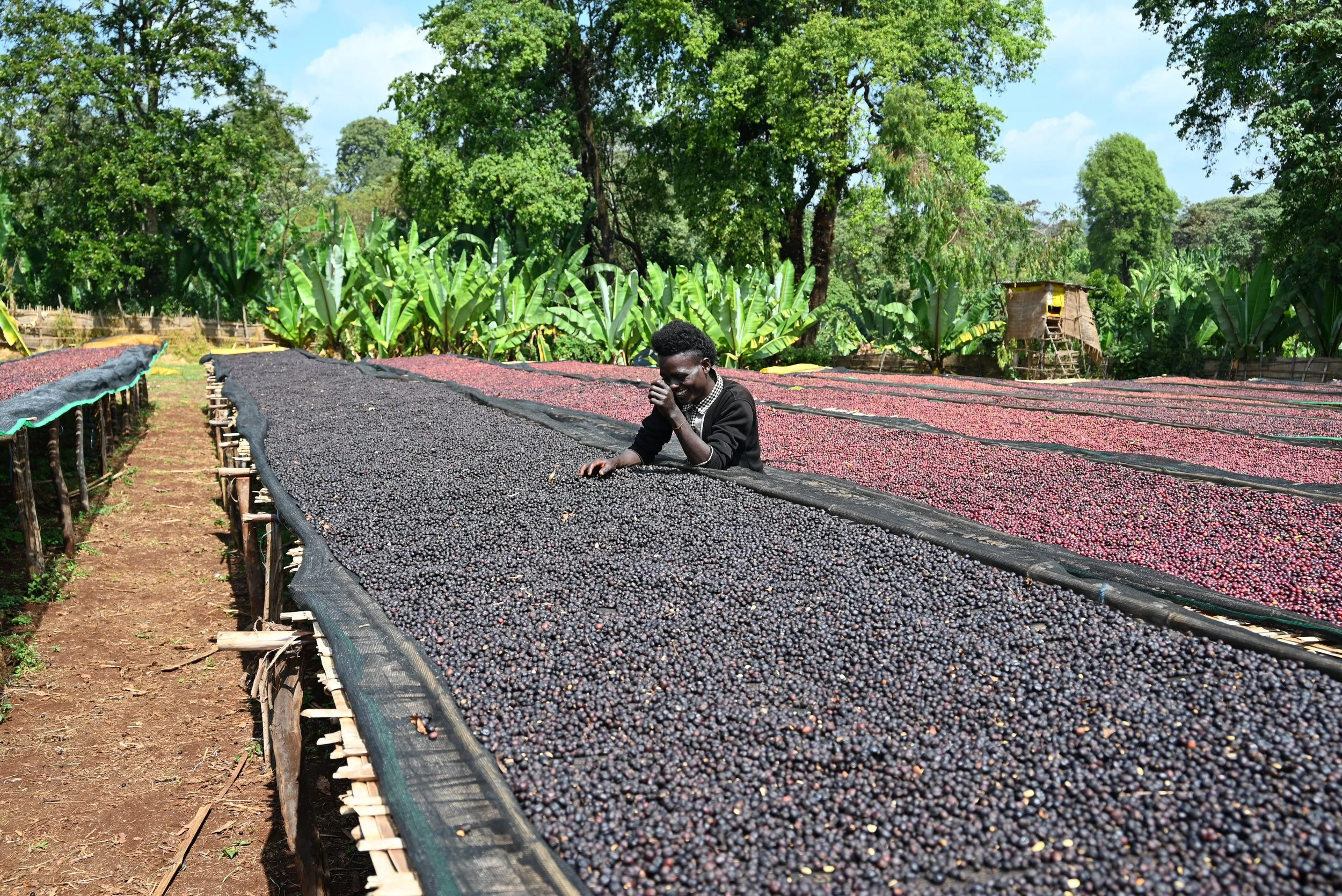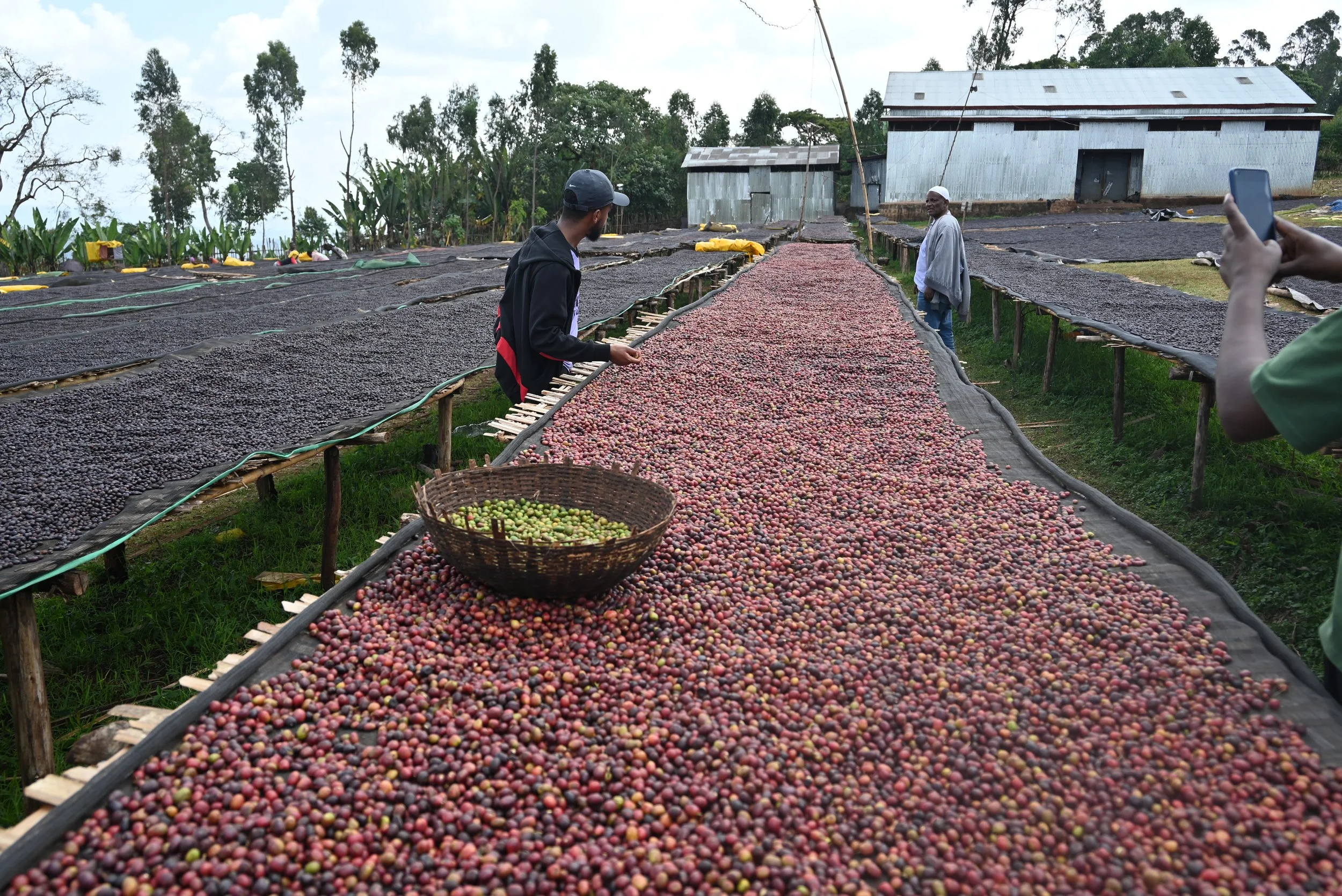GUJI SHAKISSO DEMBI UDDO GR. 2 PREMIUM Natural
GUJI SHAKISSO DEMBI UDDO
Producers: Dembi Uddo, Tero, Hangadi Kebele Smallholders (Hangadi Washing Station)
Mill/Washing Station: Hangadi Washing Station by Tracon
Bag Size: 60 Kg Grainpro
Region: Guji Zone - Guji Shakisso
Elevation: 2,100 MSAL
Grade: 2 Premium
Variety: 74110, 74112 & Local Landraces
Process: Natural
Drying Time: 18 - 21 Days on raised beds
summary
Tracon’s reputation is well regarded and are no strangers among COE members globally. In 2021, Tracon chose to participate in Ethiopia’s second ever Cup of Excellence Auction and had 2 different coffees score an impressive placement in the top 20 of all the coffees submitted in the Ethiopia COE Auction. In 2021, a record-breaking number of entries 1,849 for any countrywide Cup of Excellence competition entered the competition to compete that particular year. Placing in the best of top 20 coffees produced in Ethiopia should speak volumes for itself..
From our experience over the years of sourcing and tasting absolute stunners produced by the talented smallholders in the Guji Zone, the coffees grown in these areas are nothing short of phenomenal and are highly coveted around the world for their very high quality and distinct flavor profiles of what we know today as Guji coffees.
The cherries for this lot were sourced from the forests of Hangadi, Tero, and Dembi Uddo Kebeles (villages). Each lot purchased is directly designated to the specific village prior to any processing. Each village is a small kebele located at 2180 MSAL in Woreda Shakiso of Guji. Cherries once picked by the smallholders are delivered to two sites, Tracon’s Tero station and Hangadi Station, depending on the closest distance to travel for pickers. 750 plus farmers deliver cherries to the Hangadi station over the course of the harvest season. The process of receiving cherry has a very strict set of quality standards during harvesting, at farm level, and during evaluations of weighing cherries at both collection sites. Prices paid in the region for cherry are among the highest to guarantee quality and longevity in supporting the local farming community.
The Hangadi Washing station is managed by Mubarek Hyredin. Mubarek oversees cherry selection, post harvest production and compensation distribution directly to their local farming partners that deliver cherry to their site. Tracon permanently employs 4 people year round at this particular station and adds 60 - 90 people for full time employment during the harvest season.
Tracon has developed a state of the art modern coffee cleaning and milling facility in Addis Ababa where the coffees are all transferred for final milling following the initial collection and post harvest production phase of all their coffee. The facilty is equipped with the latest Pinhalese coffee processing equipment to sort coffees by density, size and also utilize high level pieces of automated equipment like optical color sorters for final sorting. Tracon also directly supports several of the local farming communities they work with by providing in depth training on modern farm management and harvesting practices with local farmers each year. Each lot contracted with Tracon this year was done on a prebook basis prior to the coffee harvest. We believe embracing this model equips partners with the tools and resources to provide early harvest premium payments directly to farmers and to help producers mitigate and calculate risk knowing they have a secured buying partner on the other end to support their efforts prior to picking a single cherry.
PROCESSING
Once the cherries arrive to Tracon’s washing stations, they are then evaluated based on several key factors: color, ripeness and density. The cherries are floated to remove any cherries designated as "floaters" to ensure only the cherries with the highest concentration of fruit mucilage and the highest degree of successful maturation has been achieved in both the fruit and cherry seed. Floating also assures the removal of inferior or hollow seeds and defects. Once the cherries have been separated and selected they are then placed on raised drying beds to rest 18 - 21 days. The first two days of drying are critical to the evolution and development of the coffee. The cherries are rotated by hand every hour for the first two days during the drying period to avoid uneven drying and consistent exposure to air and sunlight.
JARC VARIETIES - 1974/1975 CBD RESITANT SELECTIONS
Currently the majority of coffee produced in Ethiopia is produced from three production systems: forest, semi-forest, and garden coffee. The level of variation among coffee varieties in the forest and semi-forest production systems are recognized as a higher degree of quality than garden coffee production systems. Farmers in Ethiopia have always had an interest in changing the genetic base of their varieties in different production systems in pursuit to improve coffee production and yield. The Jimma Agricultural Research Center (JARC) has made huge contributions to the global coffee community with its efforts over the past 40 years to expand knowledge through scientific research and studies in Ethiopia. In the efforts by the (JARC) to push towards revolutionizing the development of modern coffee varieties in Ethiopia they have created innovative methods to genetically combat CBD (coffee berry disease) and increase the overall efficiency in production and yield for coffees grown naturally in the forest and semi-forest production systems.
In 1971, coffee berry disease (CBD) was spreading throughout Ethiopia and likely had been around for years. Initial trials in 1972 used chemical-based fungicides to test prevention of the disease. While these proved successful, it was decided that a better solution would be to collect and use the broad genetic diversity of Ethiopian coffee to develop CBD-resistant varieties. The selection process for these varieties began in 1973 and resulted in collections from 19 locations in Southwestern Ethiopia. After collecting seeds from 639 different coffee trees originally collected in the areas of Gera, Metu-Bishari, Washi and Wush Wush for showing resistance against CBD. For 1974 and 1975 CBD resistant improved coffee varieties, if a variety name starts either with a 74 or 75 it is a selection number given to the variety and can represent a broader group of different varieties that stem from the 1974 and 1975 CBD Resistant Selection Group.
Gera Selection: 75227, 741
Metu-Bishari: 74165, 74158, 74112, 74148, 74140
Washi: 7487, 7454, 7440, 744
Wush Wush: 754
Variety Gibirinna 74110 & Serto 74112
The level of variation among coffee varieties in the forest and semi-forest production systems are recognized as a higher degree of quality than garden coffee production systems. The 74112 variety begins with “74” to indicate the official cataloging and selection in 1974. Variety 74112 originates in the Metu-Bishari forest and was released in 1979 from it's counterpart 74110 for its disease resistance and yield potential. The trees are smaller in stature and compact.
Farmers in Ethiopia have always had an interest in changing the genetic base of their varieties in different production systems in pursuit to improve coffee production and yield. The Jimma Agricultural Research Center (JARC) has made huge contributions to the global coffee community with its efforts over the past 40 years to expand knowledge through scientific research and studies in Ethiopia. In the efforts by the (JARC) to push towards revolutionizing the development of modern coffee varieties in Ethiopia they have created innovative methods to genetically combat CBD (coffee berry disease) and increase the overall efficiency in production and yield for coffees grown naturally in the forest and semi-forest production systems.
REGIONAL INFORMATION
Guji Shakiso is a region in the southern part of Ethiopia, specifically within the Oromia region, renowned for its production of high quality coffee. Located in the Guji Zone, the town of Shakiso lies in a unique confluence of natural resources, culture, and economic activity, with coffee production being a vital economic resource. The region is named after the Guji people, an Oromo sub-group, and Shakiso serves as an important town within the coffee-producing areas of Ethiopia.
The Guji region, particularly around Shakiso, is distinguished by its high altitudes ranging from 1,800 to over 2,200 meters above sea level. This elevation provides an ideal climate for the cultivation of Arabica coffee, characterized by cool temperatures, high rainfall, and nutrient-rich volcanic soils. The area’s topography consists of rolling hills, dense rain forests, and fertile valleys, all of which contribute to the unique microclimates found in the region. Shakiso's coffee industry plays a crucial role in the livelihoods to local residents, with many families relying on coffee as their primary source of income. The coffee grown here is largely organic, often free of synthetic pesticides or fertilizers due to the remote and traditional farming practices rooted deeply in the culture. For many people in the Guji region, coffee is more than just a crop; it represents a connection to the land, community, and tradition. Coffee ceremonies are an integral part of Guji culture, serving as social gatherings where families and friends come together to prepare, drink, and share stories & memories over coffee.

